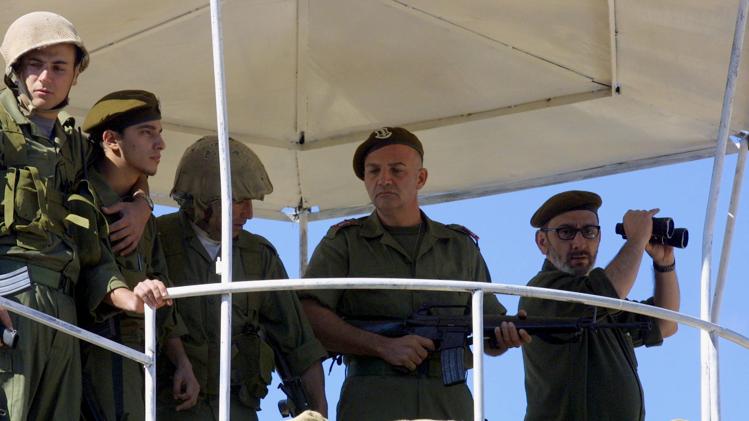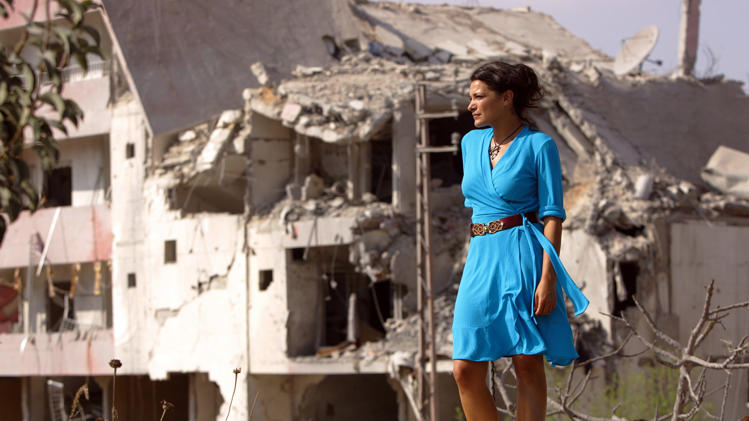
File picture of Lebanese actress Nada Abu Farhat in Sidiqin, during the shooting of "Summer Rain" by Director Philippe Aractingi
Lebanon’s civil war ended a quarter of a century ago but its filmmakers remain fixated on this dark period, seeing their movies as a kind of catharsis to help heal collective trauma.
The industry’s focus contrasts sharply with a society that has yet to come to terms with its devastating past, where war has marked the last five generations — and each community, be it Christian or Muslim, looks back through a different lens.
The latest example to hit the screens is "Mirath" ("Heritages") by French-Lebanese filmmaker Philippe Aractingi.
Mingling fact and fiction, Aractingi shares with his children memories of the 1975-1990 war, his exile and his return home, a story to which most Lebanese can relate.
"The Lebanese tend to deny the past and the war" that pitted Christian militias against Palestinian groups and their Lebanese Muslim and leftist allies, Aractingi told AFP.
"So discussing the war through cinema is kind of cathartic. In ‘Mirath’, I talk about how we need to communicate with our children, so that (war) never returns."

AFP / Ramzi Haidar
File photo of Lebanese musician and actor Ziad Rahbani (R)during shooting of late Lebanese director Randa Chahal’s film "Cerf Volant"
Among Aractingi’s other films are the 2005 "Bosta" (The Autobus) and the 2007 "Under the Bombs", which both represented Lebanon at the Academy Awards.

Unlike Egypt, the region’s filmmaking hub, Lebanese cinema has long suffered from a lack of government support, pushing directors to seek financing abroad.
The ironic yet deeply romantic films of the Rahbani brothers marked the 1960s, Lebanon’s golden age.
But then came the war, which ripped the country apart and deepened the sectarian divide. Some 150,000 people were killed and thousands of others disappeared in the bloodshed.
The big screen became a medium for self-expression in a country that was falling apart.
– ‘Still at war’ –
Two filmmakers’ names stood out during the civil war years: Burhan Alawiyeh and internationally renowned Maroun Baghdadi, who died at 43, soon after the conflict ended.
Major productions by Baghdadi — notably "Little Wars" (1982) and "Out of Life" (1991), about Western journalists being taken hostage — ushered in a string of films about the "events", a euphemism the Lebanese still use to refer to the war.
In the post-war 1990s, Ziad Doueiri’s "West Beirut" portrayed the lives of adolescents divided by war, winning the Francois Chalais prize at Cannes.
A lull followed, with films such as "Around the Pink House" by Joana Hadjithomas and Khalil Joreige, and Randa Chahhal Sabbagh’s prize-winning "The Kite" departing from the subject of war.

AFP / Patrick Baz
A file picture of Lebanese actress Nada Abu Farhat standing in front of UN soldiers during the shooting of "Summer Rain" by Director Philippe Aractingi
But from 2005 — when former prime minister Rafik Hariri was assassinated and Syria’s nearly 30-year domination of Lebanon ended — there has been a return to the civil war genre, according to filmmaker and professor Hadi Zakak.
"Filmmakers have since tried to go to the heart of the problem, to explain why Lebanon is still at war, even if in a different form," he said.
In the last nine years, the country has been rocked by a string of political crises, the targeted killings of politicians and journalists, sectarian clashes and a war with Israel.
"Since 2005, there has been an undeclared civil war," said Zakak. "Filmmakers are therefore trying to understand the past to make sense of the present."
– Forced disappearances –
Deadly clashes that have erupted, especially since the war broke out in neighbouring Syria, are a reminder that the threat of renewed sectarian conflict is never far away.

AFP / Pierre Verdy
File picture of the late Lebanese filmmaker Randa Chahal Sabbag
In March, 27 people were killed in the northern port city of Tripoli alone during 12 days of fighting between Sunni Muslim fighters, who largely support Syria’s rebels, and gunmen from the Alawite minority, who back Syrian President Bashar al-Assad.
Nadine Labaki, the superstar of Lebanon’s contemporary cinema and director of the 2007 comedy "Caramel", made "Where Do We Go Now" in 2011, a film both poignant and funny in which Christian and Muslim women in the same village try to convince their husbands to stop fighting each other.
While many aspects of Lebanon’s civil war remain unresolved, among the most painful are the issue of forced disappearances.
Bahij Hjeij’s film "Here Comes The Rain", also made in 2011, tells the story of the difficult return home of a man who spent 20 years in captivity.
In 2013, Eliane al-Raheb made "Layali Bala Nawm" ("Sleepless Nights"), which portrays the meeting of an ex-militiaman with the mother of a disappeared fighter.
The civil war, however, is still deemed "too sensitive" so kept off the school curriculum, where history instruction ends with the final withdrawal of French troops in 1946, three years after independence.
"When I see these films, I feel like I’m discovering my own country," said Christiane, a 22-year-old born after the civil war ended.
For Aractingi, the country’s filmmakers have their work cut out for them for the foreseeable future.
"Movies about the war will be made as long as the Lebanese keep living in denial of their past."



